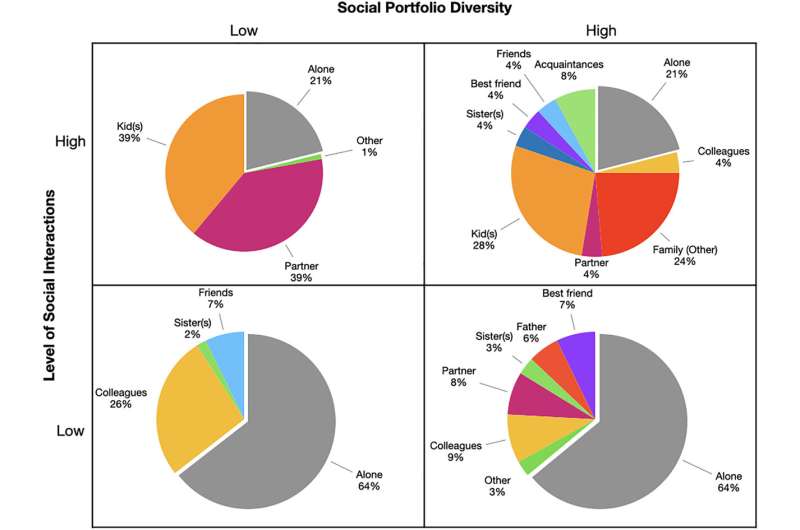Schematic representing prototypical respondents low and high in: level of social interaction (one SD below vs. above the sample mean: low = 36%, high = 79%) and level of social portfolio diversity (one SD below vs. above the sample mean: Hlow = 0.78, Hhigh = 1.71) in the French experience-sampling dataset (Study 4). Credit: Proceedings of the National Academy of Sciences (2022). DOI: 10.1073/pnas.2120668119
A team of researchers at Harvard University, working with a colleague from the University of Virginia and another from Ramon Llull University, has found via surveys that people who interact with a wide variety of other people tend to report experiencing greater satisfaction with how their life is going than do those with less variety. Their paper is published in Proceedings of the National Academy of Sciences.
Prior research has shown that there are links between the degree of social connection and personal well-being for most people—those who interact regularly with friends and colleagues tend to report being happier than loners. In this new effort, the researchers wondered if the depth of closeness between interacting people plays a role in such life satisfaction. To find out, they created several surveys designed to measure the closeness of acquaintances or other people involved in day-to-day interactions and how that impacted the degree of life satisfaction.
The researchers sent out surveys to people living in eight countries and received back more than 50,000 completed surveys. They analyzed them to learn more about associations between social interactions and life satisfaction. They found that the number of people with whom an individual interacts played a larger role in life satisfaction than did the closeness of those people to the individual. They found even talking to strangers had an impact.
They suggest their data showed that such "weak ties" play an important role in life satisfaction and overall happiness. They further suggest that this might be because people desire support from others over a wide range of characteristics. They want love and companionship, for example, from a spouse, but want validation from a colleague or even someone they have just met. They conclude by acknowledging that the structure of modern society makes it difficult for people to maintain ties with large groups of people, but suggest that making more of an effort would likely lead to a good payoff for most people.
More information: Hanne K. Collins et al, Relational diversity in social portfolios predicts well-being, Proceedings of the National Academy of Sciences (2022). DOI: 10.1073/pnas.2120668119
Journal information: Proceedings of the National Academy of Sciences
© 2022 Science X Network























